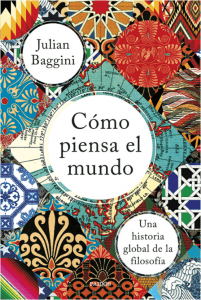

Cómo piensa el mundo, by Julian Baggini
Un paseo por las filosofías del planeta (A Global History of Philosophy)

| No of pages: | 398 |
| Publisher: | Contextos |
| Language: | Spanish |
| ISBN: | 9788449335839 |
| Year of publication | 2018 |
| Year of original publication | 2018 |
| Place of publication | Barcelona |
| Where to buy it: | Amazon |
In two sentences:
"I do not claim to be fluent in all the forms of thinking I will be introducing you to. In many ways I am helped in this project by not being an expert on every tradition I've looked at" "Chinese philosophy is profoundly non-dualistic: yin and yang represent two aspects of the same totality, not two things that need to be reconciled"
In 500 characters:
A text that goes through some of the main philosophical currents in a pleasant, relaxed way (but not easy or superficial), with a view that straddles present and future.
Structured by concepts (pragmatism, time, unity, harmony, liberation) and, in turn, large containers based on questions (How do we live? How do we know? How do we see the world?), its approach contrasts with similar texts that cannot avoid making one system or current of thought central, constantly comparing it with others.
Why I should read it:
For many of us, philosophy is something we are forced to study at school and now view with a mixture of suspicion, fear and ignorance.
The fact that formats we associate with popular culture (music, cinema, TV series, self-help) have appropriated the most reductionist and simplistic version of philosophy does not help to give it credibility and meaning for us today.
This book will help us to give a second chance to philosophy and the enormous amount of inspiration, empathy and insight it offers.
The text is designed to be read and not to be studied, explained or memorised. This may seem unimportant, but it is not. Writing a text like this with the reader in mind, making it easy and encouraging us to gradually add new layers to our knowledge is perhaps one of the book’s greatest achievements.
For connoisseurs and professionals (especially those interested in comparative studies), this text may seem amateur, but, seen from an inspiring and strategic perspective, it helps a great deal to broaden our horizons.
Considerations prior to reading:
- The fact that Baggini groups content by topic and question means that reading the text is not tiring and that we end up leaving because “we have got lost”. Perhaps the best way to read this book is to assign a certain time to it and go chapter by chapter.
- The route through different philosophies proposed by the author takes us from India to Japan, passing through Italy, China and the USA. Always explaining things in an inspiring and empathetic manner, the book works much like a complement to a travel guide.
- In some cases, the author surprises us by providing a real background to common expressions or phrases that have become apocryphal. For example, he explains why Descartes says “I am, I exist”. I won’t give any spoilers, but I will say I didn’t stop wondering where this text was when I was studying at school.
- On numerous occasions the author speaks about insights, needs and motivation. Although he does so in contexts that have little to do with marketing, strategy or innovation, the substrate is the same.
If you like this text, you might also like:
21 lessons for the 21st century, by Yuval Noah Harari